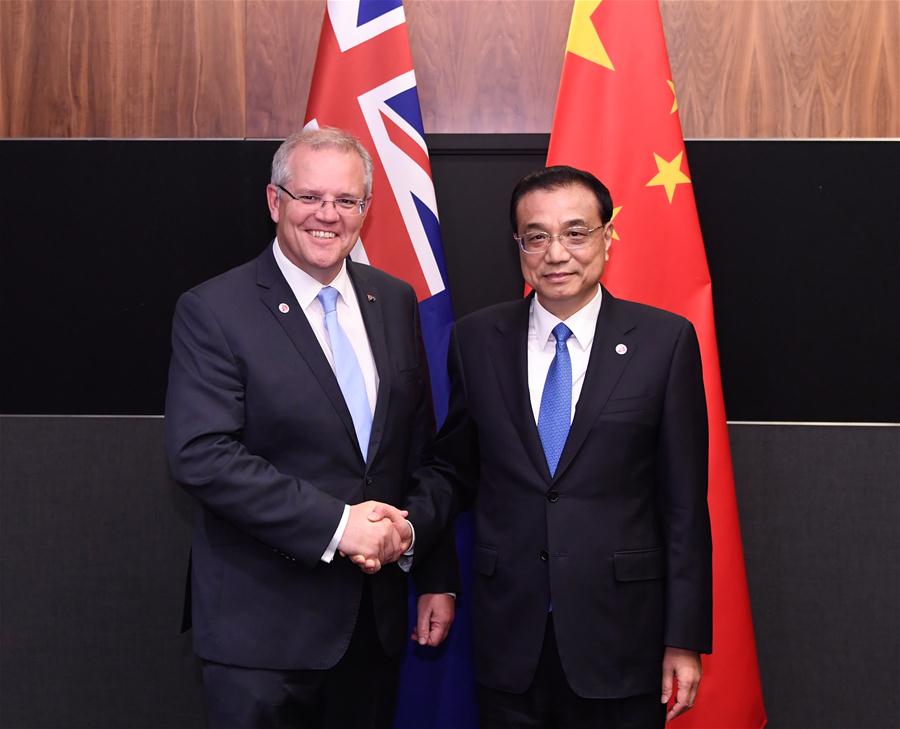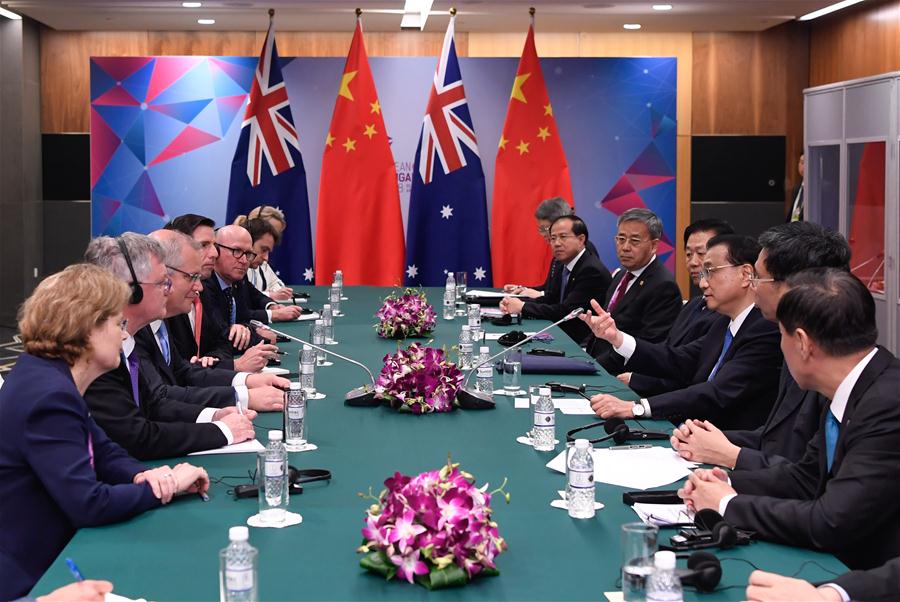Common interests between China, Australia far outweigh differences: Premier Li
Chinese Premier Li Keqiang said in Singapore on Wednesday that there are far more common interests than differences between China and Australia, calling on both sides to see the bilateral ties from a perspective of win-win cooperation.
Chinese Premier Li Keqiang said in Singapore on Wednesday that there are far more common interests than differences between China and Australia, calling on both sides to see the bilateral ties from a perspective of win-win cooperation.

Chinese Premier Li Keqiang (R) and his Australian counterpart Scott Morrison hold the sixth annual meeting between the heads of government of the two countries on the sidelines of a series of leaders' meetings on East Asian cooperation in Singapore, Nov. 14, 2018. [Photo/Xinhua]
Li made the remarks in a meeting in Singapore with his Australian counterpart Scott Morrison on the sidelines of a series of leaders' meetings on East Asian cooperation.
Li said that China and Australia have been "important partners to each other" and that the meeting with his Australian counterpart is the first annual meeting between the government leaders of the two countries since the current Australian cabinet was inaugurated in August.
The meeting on Wednesday was the sixth annual meeting between the heads of government of the two countries. The fifth was held in Canberra in March 2017.
Li also said the meeting was held at a turning point after the relations between China and Australia went through a period of twists and turns, referring to the strained bilateral ties since last year.
The common interests far outweigh the differences between the two countries, the Chinese premier said, adding that cooperation is the right choice for the two sides.
Li said China is ready for the two sides to treat each other on an equal footing, have dialogues in a candid way, properly handle their differences and see the bilateral relations from a perspective of win-win cooperation so as to forge ahead the steady development of China-Australia ties.
It is not only conducive to both nations, but also the world, he added.
The development of the bilateral ties shows China and Australia bring opportunities to each other, said Li.
China is willing to work with Australia so that the two sides can make use of their complementary strengths, tap the potentials of cooperation and expand the two-way investment and trade, he said.
China welcomes quality Australian products in its market, which means more varieties for Chinese consumers, and will continue to expand access to its market and build a market-oriented, law-based and international business environment that gives equal treatment to domestic and foreign companies, Li said.
He called on the Australian side to provide a fair and non-discriminatory business environment for Chinese investors and facilitate investments in both directions so that they can have stable expectations.
China is willing to enhance communication and coordination with Australia in multilateral affairs, jointly support multilateralism and free trade, as well as safeguard a rules-based international order and stability and development in the region and the world, Li said.

Chinese Premier Li Keqiang and his Australian counterpart Scott Morrison hold the sixth annual meeting between the heads of government of the two countries on the sidelines of a series of leaders' meetings on East Asian cooperation in Singapore, Nov. 14, 2018. [Photo/Xinhua]
Morrison said Australia sees China's development as one of the most remarkable achievements in the Asia-Pacific region.
Australia welcomes China's positive role in global and regional issues, he said, adding that China's prosperity has a spillover effect in the region and benefits countries including Australia.
Noting that his country attaches great importance to its relations with China, Morrison said Australia will continue to welcome Chinese investments, further enhance cooperation with China in areas of economy and trade, innovation, mining, tourism, energy and people-to-people exchanges and beef up communication on global challenges including climate change.

